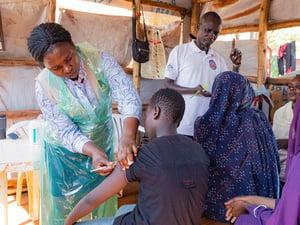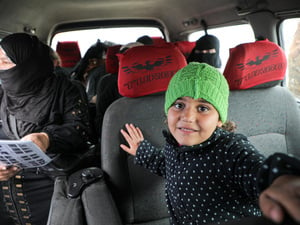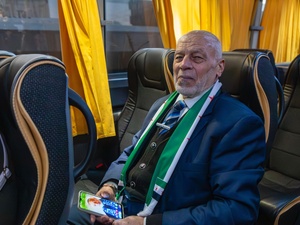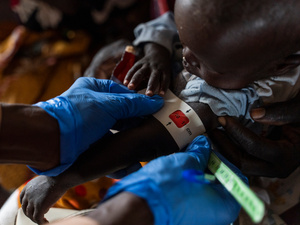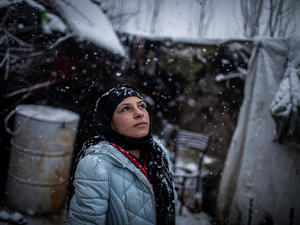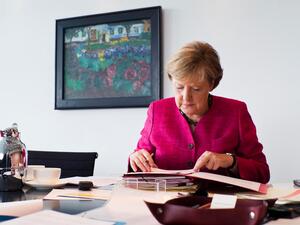UNHCR calls for more to be done for Syrian refugees with cancer
UNHCR calls for more to be done for Syrian refugees with cancer

Four-year-old Syrian refugee Zacharia lies dying of a brain tumour as his mother gives him water and his siblings look on with love and concern. He had been receiving treatment in Syria, but in Lebanon his health deteriorated dramatically.
LONDON, United Kingdom, May 26 (UNHCR) - The UN refugee agency's top medical expert warned, in a study just published by a leading British medical journal, that the number of refugees with cancer is overwhelming health systems in Jordan and Syria.
Paul Spiegel, in the latest edition Sunday of The Lancet Oncology, added that this was forcing UNHCR offices and partners to make agonizing decisions over who does and doesn't receive care. He called for urgent new steps to tackle cancer in humanitarian crises.
"We can treat everyone with measles, but we can't treat everyone with cancer," said Spiegel, a doctor, who documented hundreds of refugees in Jordan and Syria denied cancer treatment due to limited funds.
"We have to turn away cancer patients with poor prognoses because caring for them is too expensive. After losing everything at home, cancer patients face even greater suffering abroad - often at a huge emotional and financial cost to their families," he noted.
The Lancet Oncology study - which looked at refugees in Jordan and Syria from 2009-2012 - said the number of documented refugee cancer cases in the region had risen because there were more refugees overall, and because more people were fleeing middle-income countries like Syria.
Cancer is also a growing issue among refugees from low-income countries, where the focus had traditionally been on infectious diseases and malnutrition.
The most common form of cancer among refugees is breast cancer, accounting for almost a quarter of all applications in Jordan to UNHCR's Exceptional Care Committee, or ECC, which decides whether to fund expensive treatments.
In Jordan for example, the ECC could only approve 246 out of 511 (or 48 per cent) refugee applications for cancer treatment between 2010 and 2012. The main reason for denial was poor prognosis, meaning a patient had little chance of recovery, and the committee decided the limited amount of money was better spent on other patients.
In rare cases, the ECC has to reject even patients with good prognoses, because their treatment is too expensive. Adam Musa Khalifa, a UNHCR doctor who sits on the ECC in Syria, tells of an Iraqi mother of two with a rare form of breast cancer. She had to end her treatment in Iraq due to insecurity, but her therapy was too expensive to continue in Syria. The cost of cancer treatment can be as high as US$21,000 in some cases.
"We face a terrible decision over who to help," said Dr. Khalifa, a co-author of the article. "Some patients have a good prognosis, but the cost of treating them is too high. These decisions affect all of us psychologically."
Government health systems in Syria and Jordan have been overwhelmed, and private facilities are proving insufficient. International organizations have helped to expand facilities and pay for personnel and drugs, but it has not been enough, the Lancet Oncology article warns.
Refugees with cancer often have their treatments interrupted due to insecurity in their home country. In Syria, for example, many hospitals have been destroyed or closed, and physicians have fled.
"The Lancet paper leaves no doubt that cancer is an important health problem amongst refugees," said Dr. Spiegel. "We must find better ways, with host countries, to fund prevention and treatment."
New approaches could include mobile and online information campaigns focusing on preventative health, and new financing models such as crowd-funding and potentially health insurance. Any measures will need to include health-care systems in the asylum countries as a whole, to avoid inequality between host communities and refugees.
To read the report, go to http://www.thelancet.com/journals/lanonc/article/PIIS1470-2045(14)70067-1/abstract


